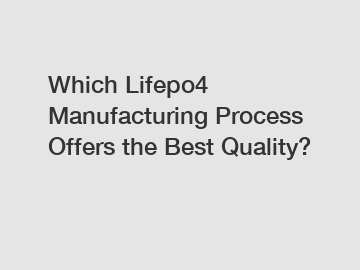Which Lifepo4 Manufacturing Process Offers the Best Quality?
Which LiFePO4 Manufacturing Process Offers the Best Quality?
In today's world, where technology reigns supreme, the demand for high-quality batteries is at an all-time high. One particular type of battery that has garnered significant attention is the LiFePO4 (Lithium Iron Phosphate) battery. Known for its exceptional performance and long-lasting nature, the LiFePO4 battery has become a popular choice for a wide range of applications, including electric vehicles, renewable energy storage, and portable electronics.
However, not all LiFePO4 batteries are created equal. The manufacturing process plays a crucial role in determining the overall quality and performance of the battery. In this blog post, we will explore different LiFePO4 manufacturing processes and discuss which one offers the best quality.

1. Pyrolysis Process:
The pyrolysis process involves heating a carbon precursor material, such as glucose or sucrose, at high temperatures to produce a carbon coating on the LiFePO4 particles. This process is relatively simple and cost-effective, making it a popular choice for many battery manufacturers.
However, the pyrolysis process has its limitations. The carbon coating produced through this method is often uneven, resulting in inconsistent battery performance. Additionally, the thickness of the carbon coating may vary, leading to decreased overall battery capacity.
2. Solid-State Reaction Process:
The solid-state reaction process involves mixing lithium carbonate, iron oxide, and phosphoric acid, followed by a series of heating and grinding steps. This process ensures a thorough and uniform distribution of the LiFePO4 particles and carbon coating.
Compared to the pyrolysis process, the solid-state reaction process offers better control over the quality and performance of the LiFePO4 battery. The resulting battery exhibits higher energy density, improved cycle life, and enhanced safety features. However, this process requires precise control of temperature and pressure, making it slightly more complex and expensive.
3. Sol-Gel Method:
The sol-gel method involves the formation of a gel-like precursor solution, which is then heated to form solid particles. This process allows for excellent control over the particle size, morphology, and uniformity of the LiFePO4 particles, resulting in improved battery performance.
The sol-gel method offers several advantages, including better crystallographic control, higher particle density, and improved electrochemical performance. However, this process requires sophisticated equipment and expertise, making it a less widely adopted manufacturing method.
In summary, while all three manufacturing processes offer their own set of advantages, the solid-state reaction process stands out as the method that offers the best quality for LiFePO4 batteries. The combination of thorough mixing, precise heating, and grinding steps ensures a uniform distribution of LiFePO4 particles and carbon coating, resulting in batteries with higher energy density, improved cycle life, and enhanced safety features.
Battery manufacturers who prioritize quality and performance often opt for the solid-state reaction process, despite its slightly higher cost and complexity. The benefits of this manufacturing process outweigh the drawbacks, as it consistently delivers batteries that meet the ever-increasing demands of modern applications.
It is important to note that while the manufacturing process plays a significant role in determining battery quality, it is not the sole factor. Other factors, such as the quality of raw materials, cell design, and assembly techniques, also contribute to the overall performance and longevity of the LiFePO4 battery.
In conclusion, when it comes to LiFePO4 battery manufacturing, the solid-state reaction process offers the best quality in terms of energy density, cycle life, and safety features. Battery manufacturers who prioritize excellence should consider adopting this method to meet the ever-growing demands of the market. By doing so, they can ensure that their LiFePO4 batteries provide long-lasting, high-performance solutions for various industries and applications.
Are you interested in learning more about Tsaker new energy, iron phosphate for sale, polyimide monomer supplier? Contact us today to secure an expert consultation!
174
0
0


Comments
All Comments (0)